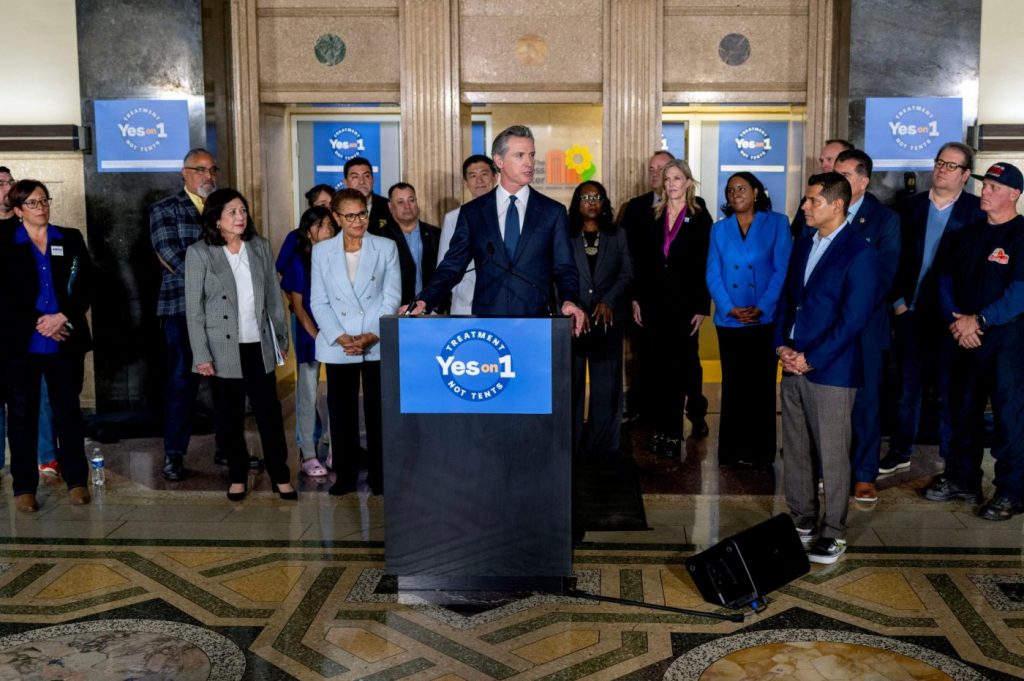Click here for a complete list of our election recommendations.
Proposition 1 is pricey. It’s complex. It’s a bold but imperfect approach to managing the state’s worsening mental health crisis.
Driven by Gov. Gavin Newsom, the measure is the only statewide proposition for the March 5 election. Contrary to the suggestion in its ballot title, it probably would not make a major dent in California’s overall homeless crisis.
But it would target a critical segment — those who are on the streets because they are not getting mental health or addiction treatment they desperately need. The measure offers an alternative to California’s current siloed approach that too often provides housing without treatment or treatment without housing.
Prop. 1 is a necessary step that voters should support.
The measure divides into two sections: First, it would authorize the state to borrow $6.4 billion through bonds to fund construction of treatment facilities and homeless housing. Second, it would change the rules for spending billions collected annually from a state income tax on millionaires that voters approved in 2004. It’s the latter part that’s the most controversial.
But let’s start with the bonds, for which repayment from the state general fund would cost an estimated $310 million annually over the next 30 years.
Of the $6.4 billion, $4.4 billion would be used to build facilities to treat 6,800 people with mental health or drug and alcohol issues. That would have a major impact on a state that, according to the nonpartisan Legislative Analyst’s Office, needs capacity to treat 10,000 more people at any one time.
The other $2 billion would go toward housing homeless people and those with mental health, drug or alcohol problems. The money would go to local governments to convert hotels, motels and other buildings into housing and to construct new dwellings.
However, the anticipated 4,350 units would minimally impact the problem of more than 180,000 Californians living on streets. More problematic, veterans make up about 6% of the homeless population, yet over half the $2 billion would be set aside for veterans. That makes no policy sense. Those provisions seem politically driven to attract special-interest support and votes.
Then there’s the reallocation of proceeds from the voter-approved, so-called “millionaires’ tax.” The tax provides a revenue stream for California’s 58 counties to fund mental health services, currently generating more than $3 billion a year. Counties use the money to treat a broad range of mental health issues with a strong focus on prevention, early intervention and community-based care.
Prop. 1 would restructure how this money is used, with a stronger focus on housing and those suffering from severe mental illness. How Prop. 1 would affect current county programs and services varies widely, depending on how each county spends its money from the millionaires’ tax now.
Counties would be required to spend 30% on housing interventions for people who are homeless or at risk of becoming homeless. Another 35% would fund services and intensive treatment for adults diagnosed with severe mental illness. That leaves 35% for behavioral health services, with about half of that funding earmarked for early intervention programs. The proposal would also offer counties some flexibility, allowing them to shift limited funds between the strict categories with state approval.
Related Articles
Editorial: Johnson brings high ethics to Alameda County judge race
Editorial: Reelect three Alameda County education board incumbents who face ill-prepared challengers
Editorial: Bauters standout of nine candidates for Alameda County supervisor
Editorial: Elect Jelani Killings to Contra Costa Board of Supervisors
Editorial: San Jose Mayor Matt Mahan deserves full four-year term
For perspective, counties currently receive about $10 billion to $13 billion a year from state and federal funding, including the millionaires’ tax, on mental health and drug or alcohol treatment, according to the legislative analyst. The fight is over how to allocate about a third of that money.
It’s understandable that some are upset by how this might affect services in some counties and that counties will have less spending flexibility. Indeed, it will force counties to spend their money more efficiently and tap new sources of funding, such as those made available by recent legislative changes in state Medi-Cal reimbursements.
That said, the state has limited resources, the current distribution of money is not getting the job done and the problem requires a statewide approach. To provide a clearer picture of federal, state and county efforts in California to address mental health issues, Prop. 1 would also require counties to report how they spend all the money from those sources.
Newsom wants to try something new. Voters should give him that chance. But they should also hold him accountable to ensure that Proposition 1 delivers promised improvements.


